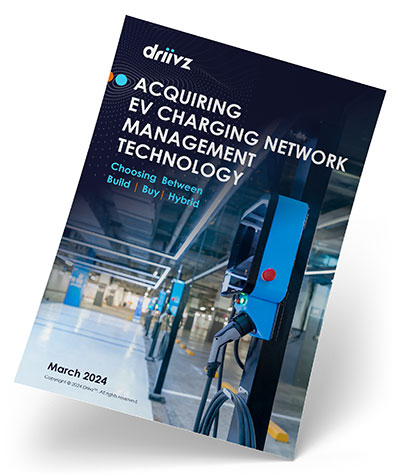Delivering solutions for electric vehicle charging is an increasingly critical and dynamic industry as EV sales rise exponentially. In fact, experts predict that the global EV charging infrastructure market itself will reach $140 billion by 2030. This hypergrowth brings concurrent challenges with network scalability and stability, energy constraints, lack of standardization, and more.
EV charging operators and e-mobility service providers must address these six imperatives to sustain outstanding EV charging network performance, enhance customer satisfaction, and improve the bottom line.
- Monitoring and control
- Scalability
- Network monetization
- Energy management optimization
- Integration and interoperability
- Flexibility and agility
EV Charging Network Monitoring and Control
Smooth operations require constant insights into infrastructure issues. Chargers need to be constantly monitored with full visibility into the charging processes to troubleshoot any issues, perform timely maintenance and upgrades, understand usage patterns, more accurately allocate chargers, etc. Real-time insights let you monitor transactions and chargers, view detailed technical logs, and apply remote commands. Furthermore, maintenance automation lets you identify charger issues as they occur and deploy self-healing actions for remote problem resolution and reduced costs.
Ideally, all this information will be delivered via clear, easy to read and use dashboards that provide the big picture, while allowing for deep drill down into individual data points to allow you to more easily understand and address specific issues in real time, decreasing TCO.

EV Charging Infrastructure Scalability
EV charging infrastructure expansion typically causes performance degradation and operational issues. When building a new or enhancing your existing EV charging network, a scalable architecture must be able to support the increase in number and types of chargers and drivers, as well as current and future business models. Increase the profitability of your EV charging network at scale by optimizing operations with a modular solution, where you can add modules on an as-needed basis, creating a robust solution whenever you need it.
EV Charging Network Monetization
Monetizing the network requires a billing solution tuned to the requirements of the EV charging industry. It needs to address every aspect of operations, including supporting various business models and pricing plans, flexible tariff management, real-time rating, and invoicing. Offering roaming services is critical to reduce your clients’ range anxiety so you need to ensure your EV charging management platform can handle multiple currencies and has been integrated with established roaming platforms including Hubject, GIREVE, and e-clearing.net to quickly and easily provide authorization, token synchronization, and transaction exchange.
To deliver a truly customized user experience, an online portal and app that’s easy to use and well designed to match your branding are necessities. Customers should be able to access everything from their real-time billing status, monthly invoices, and account details to information about charger location and availability, reserve-ahead capability, pricing, and payment capabilities. With the data you’ll be collecting about their charging habits, you’ll be able to generate comprehensive customer insights to best individualize every offering and interaction.
EV Charging Energy Management Optimization
EV charging providers need to optimize their charging infrastructure with efficient monitoring and management of energy consumption to optimally balance energy demand, avoid costly infrastructure upgrades, and maximize the value of existing investments. A smart energy management solution and smart EV charging capabilities are key in a future-proof solution, which supports exponential EV market growth by intelligently managing the energy chain and integrating batteries and renewables. Smart EV charging shifts charging loads based on dynamic grid and renewable supplies, preconfigured policies, and the needs of vehicle owners by leveraging advanced energy management algorithms, real-time monitoring of power needs, and insights into energy utilization. It efficiently distributes available power, ensuring the safe delivery of power to EVs without compromising on supplying electricity to offices and homes – ensuring the right amount of energy gets to the right resource at the right time.
Integration and Interoperability
A robust EV charging management solution must leverage best practices based on multiple deployments to integrate existing mission-critical systems and acquisitions quickly and easily. This will create an infrastructure that enables easy scaling and expansion as the charging network continues to grow. An open platform will ensure the solution can support and be integrated into other systems (CRM, billing, etc.) via API connectivity.
The platform must be compatible with various industry standards and protocols to streamline the ability to serve customers anywhere, anytime. Your e-mobility infrastructure needs to comply with OCPP 2.0.1, openADR 2.0, and ISO 15118 to support multisystem communications, a variety of chargers, and roaming. With standardized solutions, the e-mobility provider can deliver a seamless charging experience no matter where customers are, increasing the number of charging stations available to customers and strengthening their loyalty.
EV Charging Business Flexibility and Agility
With the EV market constantly changing, the EV charging infrastructure must be flexible, continuously evolving with market conditions. It needs to be modular, role-based, scalable, and customizable to any business model and requirements, allowing for network monetization while supporting complex business models. The technology must be able to support exponential EV market growth from all angles – energy demands, customer requirements, operational infrastructure, back end services, and hardware infrastructure.
An open platform removes the business and technical obstacles encountered when working with proprietary solutions and provides a fully integrated single solution that supports customization and API based development. This type of platform will deliver on the promise of business flexibility in a world of disruption and change.
Wrapping It Up
Electric vehicles present a great potential for the greening of the transport sector – and our planet. A robust, efficient, flexible, and cost-effective EV charging infrastructure still holds the key to widespread adoption. If your EV charging business is to succeed, ensure your EV charging management platform delivers on these six imperatives.





